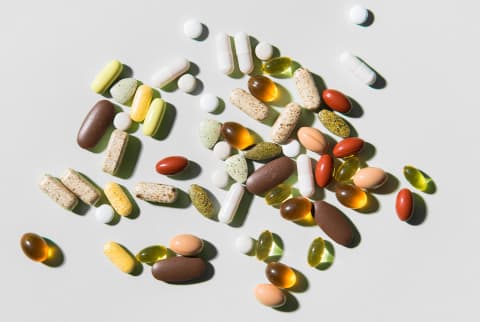Advertisement
Berberine Is Not "Nature's Ozempic" & It's Not Right For Everyone


If you search up berberine on TikTok, you'll see countless videos deeming this supplement "nature's Ozempic," which is quite the oxymoron, given that the popular weight loss drug Ozempic is anything but natural.
The collection of clips includes some berberine users reporting weight loss, some sharing unpleasant side effects, and medical professionals questioning the legitimacy of it all. To shed some light on the trendy and allegedly safe weight loss supplement, we asked experts for the 101.
What is berberine?
"Berberine is a natural bioactive compound extracted from certain plants, including the group of shrubs known as Berberis," explains board-certified internal medicine physician and chief medical officer at aging wellness clinic Modern Age Anant Vinajmoori, M.D.
While it may be new to many, berberine has been used in traditional Chinese medicine for centuries to reduce inflammation and oxidation1—though it's traditionally consumed in plant form, not as a supplement.
Berberine is one of many plant compounds that shows promise for supporting a healthy metabolism and potentially contributing to weight loss.
How does it work?
"Berberine supplements affect the body primarily by subtly interfering with the efficiency of mitochondria, which are the energy producers of your cells. This interference prompts your body to activate the AMPK pathway, improving insulin sensitivity and promoting the creation of more mitochondria," Vinajmoori explains.
Research also shows berberine has antioxidant and inflammatory balance actions2. "The result is a potential improvement in metabolism," he adds.
Another potential mechanism underlying berberine's role in insulin sensitivity is its possible action on gut microbiota3, research shows.
Does it work for weight loss?
OK, berberine is an age-old remedy with some modern research behind it. But does it actually work for weight loss? For some people, maybe. "Berberine has been linked with potential weight loss, although the scientific data supporting this is still limited," Vinajmoori says.
One review study says berberine can significantly impact blood glucose levels4, insulin sensitivity, and inflammatory status markers for those with metabolic disorders, improving body composition and reducing triglycerides, total cholesterol, LDL, and increasing HDL.
In another randomized, double-blind, placebo-controlled clinical trial that was carried out in 24 patients with a diagnosis of metabolic syndrome, taking 500 mg of berberine three times daily (so 1,500 mg/day) for three months resulted in a significant decrease in waist circumference5, systolic blood pressure, and triglycerides, and an increase in insulin sensitivity.
So while research has shown that berberine holds some promise in the weight loss realm, it's mainly been studied on those with preexisting metabolic conditions like Type 2 diabetes6.
In other words, it's not guaranteed to help just anyone lose weight. Another thing experts agree on: While berberine may play a role in weight loss for some, it's definitely not a substitute for a healthy diet and consistent exercise routine. Nor should you take berberine as a "treatment" for metabolic conditions without consulting your doctor.
Side effects & cautions
"As for side effects, berberine is generally well tolerated, but it can cause mild gastrointestinal issues, such as upset stomach, constipation, or diarrhea7," Vinajmoori says.
While these side effects are expected for some, that doesn't mean you should simply stick it out if you're noting GI upset. Stop taking the supplement and consult your doctor.
"Berberine could also cause dangerous lowering of blood sugar if taken together with other medications that lower blood sugar," he adds. Consult your doctor before taking berberine to make sure it won't interfere with your existing medications.
As for supplement shopping, be very careful where you source your berberine if you do decide to take it with the blessing of your doc. You could be getting a high dose of berberine, or you could get a minuscule dose. "High-quality berberine formulas will include efficacious doses. I'm talking at least 500 mg, but as high as 1,500 mg, is the dose researched for blood glucose-lowering benefits," mindbodygreen's vice president of scientific affairs Ashley Jordan Ferira Ph.D, RDN, notes.
Not to mention, you may not know for sure what else is in your berberine supplement, so do your research and consult your doctor if you're unsure.
A note on weight loss supplements
While berberine may be safe for most people and helpful in terms of blood sugar balance, it's the end goal of dropping weight quickly for the sake of fitting into modern beauty standards that needs to be reevaluated.
Some of the TikTok content surrounding berberine glamorizes the idea of "never feeling hungry" which is not something to aim for and a cringeworthy nod to the heroin chic era of the '90s at that.
If you find yourself interested in berberine's insulin-related benefits, that's one thing. Taking a supplement in hopes of losing weight without eating a healthy diet or exercising is another.
To be very clear, weight loss medications are not made for individuals to "fine-tune" their body or drop an extra 10 pounds before a big event—that's just dangerous misuse. Nor does skinnier always mean healthier (you could end up losing more lean mass than fat mass, for example). At the end of the day, your metabolic health is so much more than your weight or BMI.
As Bhuyan says, "It's not the magic supplement that people are hoping for."
The takeaway
Berberine has been called "nature's Ozempic" due to its potential benefits of balancing insulin and supporting weight loss in some individuals. However, berberine is not for everyone, so consult your doctor before committing to this daily supplement. And remember that there is no magic bullet for weight loss: The best way to work toward metabolic health is to eat a balanced diet rich in whole foods, exercise regularly, tend to your stress levels, get enough sleep, and then consider supplementing where appropriate.